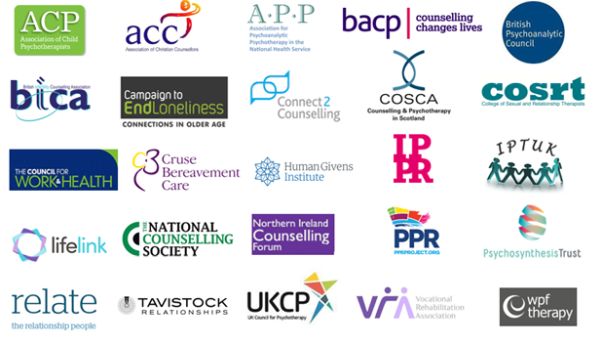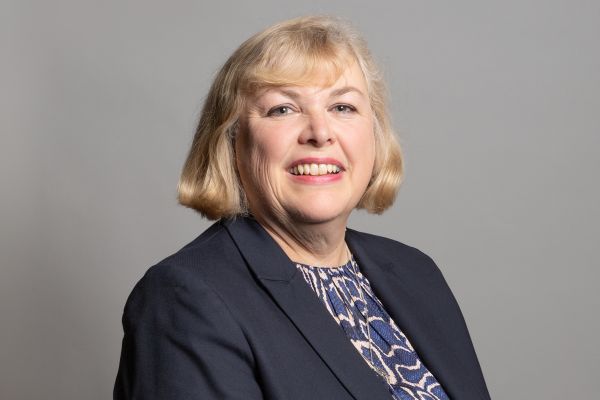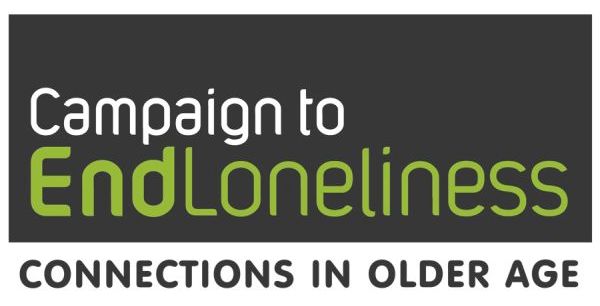Covid-19 Campaign goes from strength to strength
A big focus of the team’s work over the last few months, alongside helping inform members of changes to Government policy and guidance, has been to lead our high profile Covid-19 campaign.
The campaign launched as we entered lockdown in March. It aims to help champion the profession with policy makers across each of the four nations during these challenging times.
We've established a powerful coalition of professional bodies, service providers, trainers and individual therapists to maximise the role of counselling and psychotherapy in supporting the nation through the coronavirus crisis.
Initially launching with BPC and UKCP, we’ve now secured support from 25 partner organisations.
Recently we’ve strengthened our core campaign asks to reflect the challenges which have emerged through the pandemic, to ensure they support those communities most affected, and ensure Government does all it can to support therapists to be able to offer their services safely and to help tackle the growing demand that will undoubtedly follow the crisis.
We've secured excellent support and buy-in from politicians across the political spectrum in all the parliaments of the four nations.
And we’ve asked our members to write to Members of Parliament and devolved representatives, using our online letter tool. This small task will have a massive impact on strengthening our voice in our ongoing discussions with Government and the opposition parties.

Working with governments and stakeholders
Meeting Labour's Shadow Mental Health Minister
Fiona Ballantine-Dykes and Steve Mulligan met Dr Rosena Allin-Khan, Labour's new Shadow Mental Health Minister, in June to discuss our Covid-19 campaign.
Dr Allin-Khan noted her support for counselling and confirmed Labour were fully supportive of our campaign proposals and offered to champion these in Parliament.
We emphasised the need for Government to provide additional paid psychological support to enable our members to help support key workers during these challenging times.
A couple of weeks after our meeting, we were delighted to see Dr Allin-Khan, launch Labour's new "Care for Carers" policy, which closely mirrored our campaign asks in calling for a range of paid professional therapeutic support for NHS workers and other carers on the front line of the pandemic.
This will include a new national hotline available 24 hours a day, specialist assessments and referrals, and specialist psychological support including psychotherapy, group therapy and telephone therapies. This will be enhanced with signposting to appropriate external services, such as alcohol and addiction services.

Dr Rosena Allin-Khan
Meeting with Jane Hunt MP
Suky Kaur and Steve Mulligan held a very positive meeting with Jane Hunt, a backbench Conservative MP representing Loughborough, who was elected in December and has a passion for children and young people's mental health.
The broad focus was our Covid-19 campaign and to build further support behind our asks.
Jane was particularly interested in our proposals to address labour market challenges through enhanced business support to enable counsellors to meet the growing need for urgent mental health support.
Jane is keen to help raise these issues on our behalf, through Parliamentary questions and representations to her frontbench Treasury and Health colleagues.
She’s also keen to help us push for a funded programme of counselling in schools across England, as we have across the other nations of the UK.

Jane Hunt MP
Our CYPF Lead Jo Holmes, alongside CYPF divisional network members and Natalie Phillips (MBACP), urged Westminster to fund a school and college counselling service in England in line with the rest of the UK.
A letter was sent to Gavin Williamson, the Secretary of State for Education, outlining a number of key school-based counselling campaign asks.
Jo and Martin Bell, our Deputy Head of Policy and Public Affairs, met officials from the Department for Education, alongside a representative from the Department of Health.
They shared our vision and costings for a nationally funded school counselling programme, partly in response to the rising mental health needs of CYPF during the pandemic, but also to meet the needs that existed before Covid-19.
School counselling survey
Jo Holmes and Duncan McCaig from our Research Team, worked with Mick Cooper and Jessica Bryant from Roehampton University, to design a survey of counsellors and psychotherapists working with 5 to 18 year olds in educational settings in the UK.
The research focuses on how the profession has responded to Covid-19 and what’s needed as we move into the future.
It aims to influence policy makers to ensure the highest standard of services for CYP.
Jo and Mick talk about the background to the survey and what they’re hoping to achieve in this video. The survey is open until the end of July.
Members working in Wales can feedback in the survey what school-based counselling themes they’d like to see at our Welsh CYPF Conference scheduled for next year.
CYPF coaching network
Jo Holmes and Carolyn Mumby, our Coaching Division Chair, held a Zoom meeting with counsellors who want to promote coaching as a choice for young people in a range of settings.
Future meetings will be chaired by Nicola Rickaby, an integrative therapist and coach who values the lack of stigma often associated with this strengths--based approach.
The group currently has 15 members and is now part of BACP’s Network Meetings cohorts.

Youth access
Jo Holmes has strengthened links with Youth Access, with a focus on scoping the staff training needs of youth information advice and counselling services linked to CYP competences.
The aim is to work collaboratively with Youth Access and its community-based service members, building upon the existing network of services, some of which are BACP CYP accredited.
Youth Access have launched a remote support toolkit which aligns with our guidance and the work on our CYPF FAQs.
Newsweek focus on schools counselling
Jo Holmes spoke to Newsweek about the call for a counsellor in every school in England. She noted counsellors had reported young people talking about heightened levels of stress, fear and anxiety as well as being worried about parents’ employment and finances.
Natalie Phillips (MBACP) also contributed to the article, discussing the different issues young people were bringing to therapy.
Find out more about our children, young people and families work
Healthcare
Psychological Professions into Action Campaign

The third online engagement exercise for the Psychological Professions into Action campaign took place in June.
The campaign aims to engage practitioners across 12 different psychological professions in a conversation how we can increase the influence of therapies and bring about a more psychologically informed healthcare system.
We’ve been involved since its launch in January and encouraged our members to get involved and input their ideas.
We’ve made the case for counselling and psychotherapy by stressing the importance of choice to outcomes and the need for increased availability and access for all people, particularly with anticipated increases in demand as a result of Covid-19.
The campaign results will help inform the next draft of the NHS People Plan – the five-year workforce plan for the NHS in England.
NHS Education for Scotland Meeting
Matt Smith-Lilley and Steve Mulligan met the Psychological Interventions and Therapies for Adult Mental Health Team at NHS Education for Scotland. They discussed their role in training and developing the psychological professions workforce in Scotland, including counselling and psychotherapy.
There were agreements to include them in the next round of consultation on SCoPEd and for us to be involved in the ongoing review of Matrix – A Guide to Delivering Evidence Based Psychological Therapies in Scotland.
We worked with our strategic partner Cruse Bereavement Care to produce a joint briefing recognising the heightened levels of distress experienced by people bereaved by and during the pandemic.
Linked to our Covid-19 campaign, it articulates the role of trauma-informed approaches to bereavement and recommends tiered services that draw on community assets, deploy trained bereavement supporters and engage trained and qualified counsellors.

Campaign to End Loneliness
We’re part of the Campaign to End Loneliness project group producing a report on psychological approaches to loneliness.
The report, due for publication in mid-July, explores how psychological therapies can complement responses to loneliness.
The report will include reference to the new BACP counselling skills competencies framework and includes case studies of counselling services working with older people. The Campaign to End Loneliness has added its support to our Covid-19 policy campaign.

Find out more about our older people work
Coronavirus: Returning to face to face work guidance for members
Almost 80% of members who responded to our recent Covid-19 survey reported losing significant and unsustainable levels of income due to lockdown restrictions, notably the loss of face to face working.
Several announcements were made by Government in June about the further easing of lockdown measures which offer the potential for some to return to face to face work.
However, with each of the Four Nations taking a different approach, the landscape of guidance was quite confusing.
To help our members, we compared the social distancing restrictions, guidance and proposals in each part of the UK, offering key messages for our members to consider alongside practical considerations of returning to face to face working.
New campaign on conditionality and sanctions launched
We've signed up to a joint campaign calling for the regulations that suspended work related conditionality, which expired on Tuesday 30 June, be extended by a further six months.
The campaign's joint statement states: "At the end of March the Government suspended all work-related conditionality and sanctions for people on Universal Credit for a period of three months.
"This was a welcome step that recognised the exceptional pressures on the labour market as well as the operational challenges being faced by the Department for Work and Pensions. Those regulations are due to expire on Tuesday, June 30.
"As the Government’s Jobs Retention scheme comes to an end with the UK facing the risk of the biggest increase in unemployment in a generation, we're calling for a further six-month suspension of work-related conditionality and sanctions.
"This would recognise that the employment market has fundamentally changed in the past few months and may get worse in the near future, while giving the time and space to develop programmes and policies that give people all the support they need to get back to work."
Find out more about our Workforce work
Meeting our members
Listening to our members
Members have responded to our Covid-19 policy campaign by sharing their counselling experiences.
Val O’Dea, concerned at the limited support networks for people who are ageing without children, contributed to a blog on the subject and is keen to support future policy work to ensure this growing hidden demographic is included in our work understanding and promoting talking therapies for older people.
As part of work with the Coaching Division to articulate how they have an important role to play in responding to the pandemic, member Sue Sutcliffe shared perspectives on her work with people adapting to new lives following retirement and finds comparisons in the ways we’re having to adapt to lockdown.
For further information about any of the articles in this issue, or to speak to our Policy team, please email publicaffairs@bacp.co.uk
